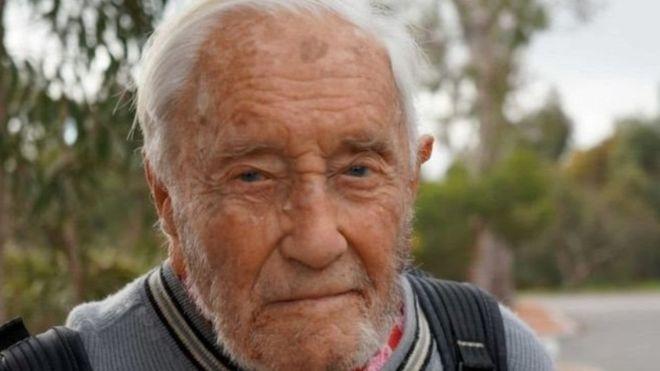
David Goodall who is 104 years old has reignited the debate on euthanasia following a decision to fly to Switzerland to end his life; Australia’s oldest scientist doesn’t have a terminal illness but says he regrets living to such an old age.
“I’m not happy. I want to die. It’s not sad particularly. What is sad is if one is prevented [from dying].” Professor Goodall told Australian broadcaster ABC.
“My feeling is that an old person like myself should have full citizenship rights including the right of assisted suicide,” Professor Goodall added.
A fundraising petition set up to help pay for Professor Goodall to upgrade his economy seat to business class on a flight to Switzerland to prevent his dying on his way. Exit Australia has arranged a fast track appointed with assisted dying agency Life Circle in Basel.
“Having celebrated his 104th birthday in early April, David has decided now is the time to go,” the GoFundMe petition states. The campaign, which is trending online, has raised almost US$14,000. The situation of Professor Goodall drives home the absolute limited value of an end of life law that is based solely upon a person’s health.” GoFundMe states.
Euthanasia remains a complicated and controversial debate in the UK. Charity, Dignity in Dying is campaigning for a law in the UK to allow terminally ill people with six months or less to live, the option to decide when the die.
Assisted suicide is illegal in the UK, punishable up to 14 years in jail, with the exception of “passive euthanasia” which is when medical professionals can withdraw treatment, such as turning off a life support machine. Terminally ill patients, who still have their brain faculties, are allowed to refuse treatment in hospices.
Meanwhile, a terminally ill man is challenging the law on assisted dying at the court of appeal in London arguing that he be allowed to die while he can still make the decision too. Noel Conway has degenerative condition Motor Neurone Disease (MND).
Mr. Conway’s lawyers say he wants to be able to be assisted with suicide when he has six months left to live and still has the mental capacity to make that decision. MND affects the nerves in the brain and spinal cord, which causes muscles to weaken and degenerate over time.
However campaign group ‘The Distant Voices’ is outside the Royal Courts of Justice to argue that the challenge brought by Noel Conway “would have huge consequences” for some people with disabilities.
“Should Mr. Conway win his case is will change my life forever,” Nikki Kenward, who has Guillain-Barre syndrome, said in a statement. “As a disabled person I am only too aware that some people see me as having ‘no quality of life,’ please don’t tell me I will not be vulnerable if euthanasia is legalized.” Nikki Kenward added.
On the other side outside the Royal Courts of Justice members of campaign group Dignity in Dying have gathered in support of Noel Conway.
“Noel’s case has confirmed that the courts do have the authority to declare the law incompatible with human rights legislation,” Sarah Wootton, chief executive of Dignity in Dying said in a statement.
Assisted suicide is illegal in most countries around the world. Canada legalized medical aid in dying (MAID) in June 2016. Victoria recently became the first Australian state to pass a Bill legalizing assisted dying for terminally ill people in November 2017. Colorado in America is the sixth state to legalize assisted dying for terminally ill people in November 2016.













